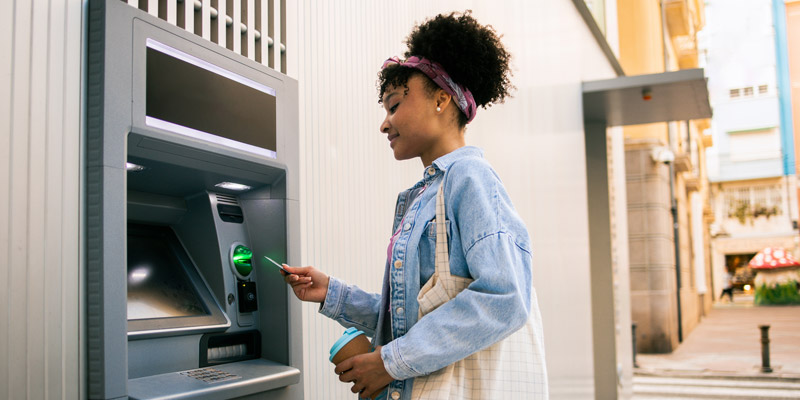Why is it Important to Have a Checking Account

 Peter Park
May 06, 2024
Peter Park
May 06, 2024
SVP, National Sales Manager-Mortgage Banking
Once you have lived in New York and it has become your home, no place else is good enough. – John Steinbeck
Though John Steinbeck's heyday may be nearly a century behind us, his words still resonate strongly today. The allure of New York City is undeniable, from its vibrant energy to its unique neighborhoods and the promise of new opportunities. Indeed, possessing your own piece of this remarkable city can be incredibly thrilling!

As the most populated city in the country, it's natural that New York’s mortgage lenders and housing market wouldn’t always follow the typical patterns. Prospective home buyers searching in the Big Apple confronted record-low inventory numbers in 2023 yet received the promise of an optimistic 2024, presenting waves of mixed emotions and potential confusion.
New Yorkers shouldn't be deterred from pursuing homeownership; rather, they should approach the process with a clear-headed mindset and a thorough understanding of both their personal finances and the overall market dynamics. Additionally, seeking pre-approval from a trusted New York mortgage company will empower them to act swiftly when the right house or condo becomes available.
At Bank of Hope, we're committed to supporting you at every turn, from offering budgeting guidance to suggesting the best loan structure in light of current mortgage rates and your unique financial goals. Furthermore, we take great pride in offering personalized insights tailored to the ins and outs of securing a mortgage (and property) in New York City.
Visit our Mortgage page or connect with a New York-based loan officer
At Bank of Hope, we're committed to supporting you at every turn, from offering budgeting guidance to suggesting the best loan structure in light of current mortgage rates and your unique financial goals. Furthermore, we take great pride in offering personalized insights tailored to the ins and outs of securing a mortgage (and property) in New York City.
The mortgage rate a company or bank will offer is determined by your personal finances, meaning that one New Yorker’s rate may differ from another. However, below are the typical mortgage rates as they stand today:
Home Mortgage Loans | Bank of Hope
So, what is considered by New York mortgage companies when assessing you as a candidate and providing a rate?
What’s most important to recognize about mortgages is that they’re not one-size-fits-all. There’s no simple answer regarding whether you should opt for shorter or longer terms, or determine the ideal amount of savings to allocate as a down payment. This underscores the importance of collaborating with a reputable New York mortgage lender. Ideally, they will invest the necessary time to evaluate the advantages and disadvantages of various loan options, customizing their advice to align with your planned duration of residence, expected life events (such as starting a family), and overarching financial goals.
In simple terms, Bank of Hope understands the intricacies of the NYC housing market and operates with a community-oriented attitude, positioning us as one of the best mortgage lenders available in the Big Apple.
We are proud to serve the varied financial needs of New Yorkers with multiple branches throughout the city. Furthermore, our commitment to bettering NYC goes beyond merely offering mortgages and fiscal guidance – through efforts like our Hope Scholarship and community development services, we find ways to give back to the areas we serve.
Visit our Mortgage page or connect with an NYC-based loan officer
Business Insider reports that the median monthly mortgage payment is $2,991. While this is noticeably higher than what’s paid in most major cities, New York buyers can take solace in the fact that Los Angeles mortgage rates are even higher, averaging out to $3,239 per month.
The New York housing market follows the same seasonal patterns as much of the country (unlike sunny LA), with the majority of home sales occurring in spring and summer. During these seasons, buyers will have more inventory to consider, but they'll also face more competition. In colder months, there's traditionally significantly less inventory available, which can mean less competition and more negotiating power for buyers. For instance, sellers in October or November might anticipate fewer takers during the long winter ahead and, in their eagerness to offload their New York property, may accept a discounted price they would otherwise refuse.
Our point? Any month can be a good time to buy a New York home, as long as you approach the process understanding the pros and cons at your disposal.
When we look at property tax rates at the state level, New York doesn’t even rank amongst the top 10 most expensive. As noted by CNBC, New Jersey takes the top spot with a rate of 2.23%, significantly higher than New York's 1.4%. Even neighboring Pennsylvania is higher with 1.5%.
However, many NYC homeowners confront growing property tax rates, as highlighted in this report. To better understand the city’s taxes, it’s helpful to recognize that different types of properties receive different policies. For this reason, condos and co-ops have experienced significant surges in taxes while other types (like commercial buildings) saw decreases.
To quote the above-mentioned report: Market turbulence during the pandemic caused a significantly larger increase in tax bills for lower-value properties than for higher-value properties . . . Working- and middle-class New Yorkers pay a higher rate on their property taxes, one of the largest contributors to housing costs, than their wealthier counterparts.
New York City tends to favor condo associations over homeowner associations (HOA). Both operate similarly, often putting forth specific Covenants, Conditions, and Restrictions (CC&Rs) for all unit owners to follow. These can include guest and subletting policies, aesthetic choices, and common space usage.
Important to note about condo boards in NYC is that they often vet candidates, often through extensive applications and interviews. Furthermore, condo association rates are often higher than what’s reported throughout the country. This is partially attributed to the overall steeper incomes and cost of living in New York City, but also the fact that condo associations often cover units’ utilities and services. In comparison, many HOAs outside of New York don’t factor such expenses into their rates.
Finally, know that HOA fees often increase from one year to the next, regardless of whether you live in NYC. While you can’t pull out a crystal ball to predict how the condo board will act in the future, set aside a “cushion” within your monthly budget for such rate surges.
Firstly, homeowners insurance costs are noticeably higher than those in other parts of the country. This is primarily a reflection of the higher home costs of New York City, as well as the fact that many of the buildings are older rather than considered “new construction.” When trying to determine how much to budget for home insurance on top of your monthly mortgage payment, consult with flood maps to determine if you are purchasing within a flood zone. Also be mindful that an area’s higher crime rates may result in higher rates.
A widely accepted prediction is that home insurance rates will only increase with time as the prevalence of natural disasters increases. Therefore, we suggest having wiggle room in your budget for such future price jumps by not stretching your finances too thin with your existing mortgage payments and insurance policy.
Stating the obvious, New York City is a big place! Therefore, it’s only natural that some specific neighborhoods’ housing markets would be hotter than others, and that trends will remain fluid in response to evolving community developments. Furthermore, “better” can be defined using a variety of different metrics, including the current average housing prices, projected growth, unit availability, and more.
As of 2024, Manhattan has the highest average monthly mortgage, followed by Brooklyn. This can make the other boroughs—Queens, Staten Island, and the Bronx—quite desirable for families seeking housing within a strict budget or who prioritize square footage. Coincidence or not, the top 5 neighborhoods for adding housing all fall outside of Manhattan.
There are multiple ways to get an accurate sense of the fair market value (FMV) of your new NYC home. Tools like Zillow and Redfin show the selling price for homes recently purchased, allowing you to do a direct comparison for properties of similar square footage and utilities.
What’s more, partner with a knowledgeable mortgage provider familiar with the NYC housing market, like Bank of Hope, who will conduct an appraisal to ensure that they’re not lending you more than the property’s worth.
Lastly, remember that information is power! Inquire about what the HOA fees will cover specifically, and always insist on a home inspection prior to committing to the purchase.
Acquiring a mortgage for a NYC home can be a long journey with many steps and potential points of confusion. Below are readings compiled by the Bank of Hope team to shed light on questions we often receive:
Moreover, we’re here to help with one-on-one attention. Dive into our mortgage services or schedule an appointment with a financial expert who can help guide you through the ins-and-outs of receiving a mortgage in New York City.


